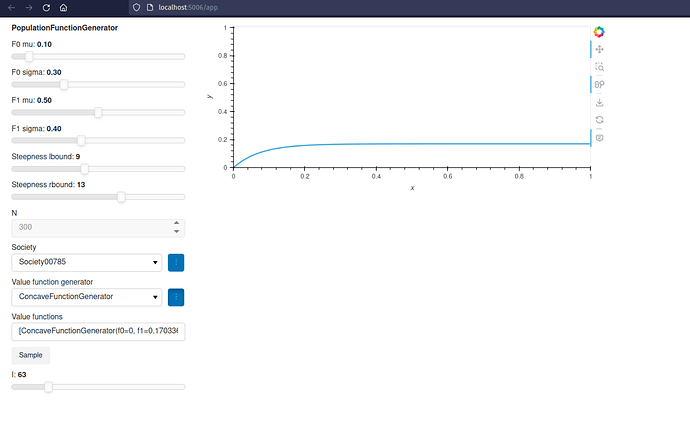Hi Holoviz Community.
I would like to post my app to the community in exchange for requesting code reviews and some help with troubleshooting ![]() You may also find the content interesting.
You may also find the content interesting.
The work is inspired by this paper:
The app so far looks like this:
import hvplot.pandas
import numbergen as ng
import numpy as np
import pandas as pd
import panel as pn
import param as pm
class Society(pm.Parameterized):
N = pm.Integer(default=30, bounds=(1, None))
C = pm.Integer(default=20, bounds=(1, None))
P = pm.Integer(default=10, bounds=(1, None))
society = pm.List(precedence=1)
community = pm.List(precedence=1)
public_goods = pm.List(precedence=1)
sample = pm.Action(lambda self: self._sample())
def __init__(self, **params):
super().__init__(**params)
self._sample()
@pm.depends('N', 'C', 'P', watch=True)
def _sample(self):
self.society = list(range(self.N))
self.community = list(
np.random.choice(a=list(self.society), size=self.C, replace=False, p=None)
)
self.public_goods = list(
enumerate(
np.random.choice(
a=list(self.community),
size=self.P,
replace=True,
p=None,
)
)
)
def text_view(self):
text = f"""
Number of Citizens in the Society: **{self.N}**\n
Community Size: **{self.C}**\n
Number of Public Goods: **{self.P}**\n
Society: **{self.society}**\n
Community: **{self.community}**\n
Public Goods: **{self.public_goods}**"""
return pn.pane.Markdown(text)
def view(self):
"""🌶️"""
return pn.Row(self, self.text_view)
society = Society()
class ConcaveFunctionGenerator(pm.Parameterized):
f0 = pm.Number(default=0.2, bounds=(0, 1), doc='Value of f(0)')
f1 = pm.Number(default=0.8, bounds=(0, 1), softbounds=(0, 1), doc='Value of f(1)')
steepness = pm.Number(default=5, bounds=(1, 20), doc='Steepness of the curve')
def __init__(self, **params):
super().__init__(**params)
self._update_f1_bounds()
@pm.depends('f0', watch=True)
def _update_f1_bounds(self):
# Clip the value of f1 if it's below f0
self.f1 = max(self.f0, self.f1)
# Update the lower bound of f1 to be the value of f0
self.param['f1'].bounds = (self.f0, 1)
def x(self):
return np.linspace(0, 1, 400)
def f(self, x):
# Using the negative exponential function as a base
y = 1 - np.exp(-self.steepness * x)
# Adjusting the function to start at f0 and end at f1
y = self.f0 + (self.f1 - self.f0) * (y - y.min()) / (y.max() - y.min())
return y
def chart_view(self):
x = self.x()
y = self.f(x)
df = pd.DataFrame({'x': x, 'y': y})
return df.hvplot.line(x='x', y='y', ylim=(0, 1.01))
def view(self):
return pn.Row(self, self.chart_view)
concave_gen = ConcaveFunctionGenerator()
app = pn.Column(society.view(), concave_gen.view())
class PopulationFunctionGenerator(pm.Parameterized):
f0_mu = pm.Number(default=0.1, bounds=(0, 1), doc='Mean Value of f(0)')
f0_sigma = pm.Number(default=0.3, bounds=(0, 1), doc='Standard Deviationn of f(0)')
f1_mu = pm.Number(default=0.5, bounds=(0, 1), doc='Mean Value of f(1)')
f1_sigma = pm.Number(default=0.4, bounds=(0, 1), doc='Standard Deviationn of f(1)')
steepness_lbound = pm.Integer(
default=1, bounds=(1, 20), doc='Lower Bound of Steepness'
)
steepness_rbound = pm.Integer(
default=20, bounds=(1, 20), doc='Upper Bound of Steepness'
)
n = pm.Integer(constant=True)
society = pm.Selector(default=society, objects=[society], instantiate=True)
value_function_generator = pm.Selector(
default=ConcaveFunctionGenerator,
objects=[ConcaveFunctionGenerator],
instantiate=True,
)
value_functions = pm.List()
sample = pm.Action(lambda self: self._sample(), instantiate=True)
i = pm.Integer(0)
def __init__(self, **params):
super().__init__(**params)
self._update()
self._sample()
@pm.depends('society.public_goods', 'society.society', watch=True)
def _update(self):
with pm.edit_constant(self):
self.n = len(self.society.public_goods) * len(self.society.society)
self.param['i'].bounds = (0, self.n - 1)
@pm.depends('steepness_lbound', watch=True)
def _update_steepness_rbound_bounds(self):
# Clip the value of f1 if it's below f0
self.steepness_rbound = max(self.steepness_lbound, self.steepness_rbound)
# Update the lower bound of f1 to be the value of f0
self.param['steepness_rbound'].bounds = (self.steepness_lbound, 20)
# fix this so the parameters are from this class
def concave_function_parameters_generator(self):
return dict(
f0=ng.BoundedNumber(
generator=ng.NormalRandom(mu=self.f0_mu, sigma=self.f0_sigma),
bounds=(0, 1),
)(),
f1=ng.BoundedNumber(
generator=ng.NormalRandom(mu=self.f1_mu, sigma=self.f1_sigma),
bounds=(0, 1),
)(),
steepness=ng.UniformRandom(
lbound=self.steepness_lbound, ubound=self.steepness_rbound
)(),
)
@pm.depends(
'steepness_lbound',
'steepness_rbound',
'f0_mu',
'f0_sigma',
'f1_mu',
'f1_sigma',
watch=True,
)
def _sample(self):
value_functions = [
self.value_function_generator(
**self.concave_function_parameters_generator()
)
for p_i in range(self.n)
]
self.value_functions = value_functions
# @pm.depends('i')
def samples_view(self):
return self.value_functions[self.i].chart_view()
@pm.depends('i', 'steepness_lbound')
def view(self):
return pn.Row(self, self.samples_view())
population_function_generator = PopulationFunctionGenerator(
society=society,
value_function_generator=ConcaveFunctionGenerator,
)
app = population_function_generator.view()
if __name__ == '__main__':
print(society)
print(concave_gen)
print(population_function_generator)
print('here')
I’m aiming to work my way through the paper in the form of a panel app. The following is an approach to sampling concave, smooth, increasing functions.
The app is deployed with:
panel serve app/app.py --autoreload
Problem #1: the above is not re-drawing at
population_function_generator.view()
ie. the chart is not redrawing when I slide i at the bottom.
Problem #2: The toggle buttons are not working for the Selector Drop Downs. The expand functionality.
I read through the following resource:
https://panel.holoviz.org/how_to/param/subobjects.html
Which I posted a minimum example here: Panel Selector Expand Not Working After Restarting Server - #3 by LinuxIsCool
In general, you can follow the developments here:
Holoviz community rocks ![]()
